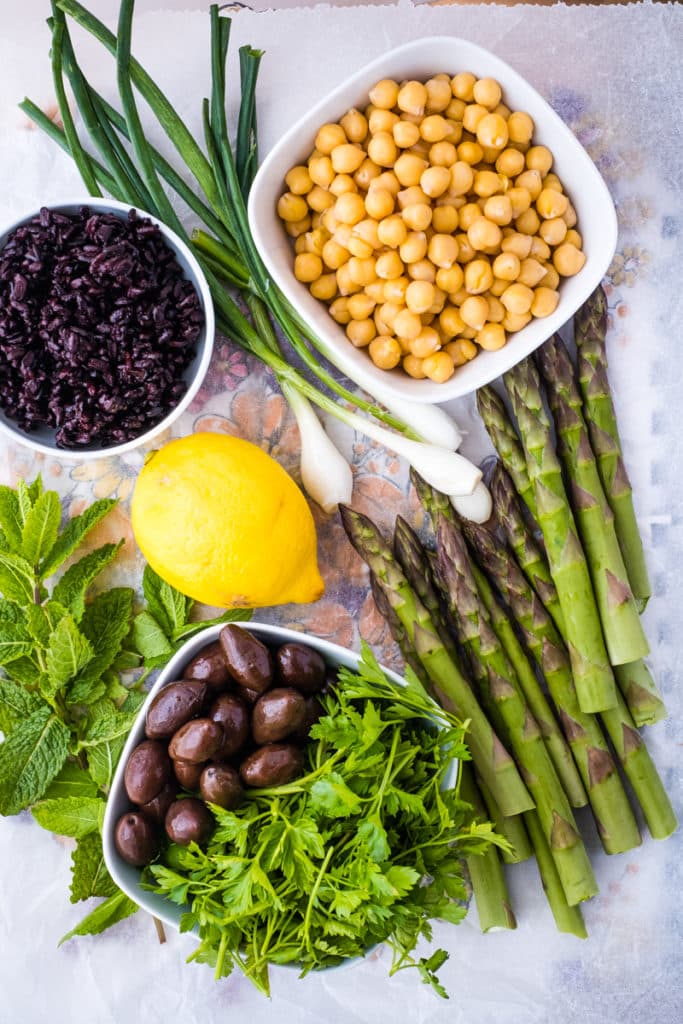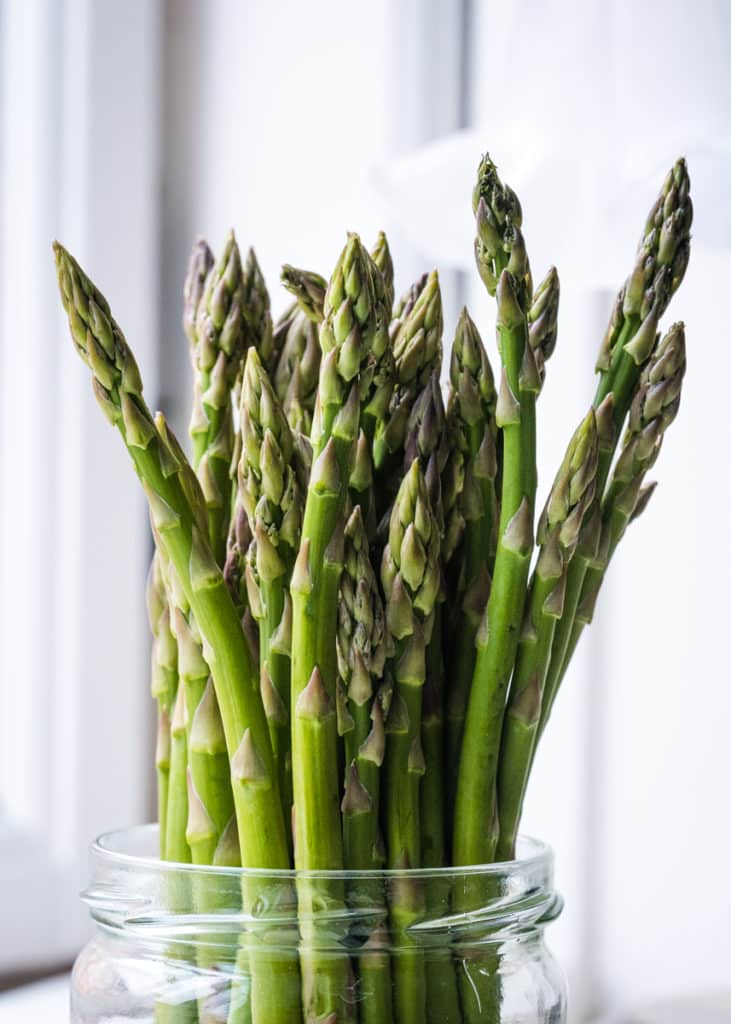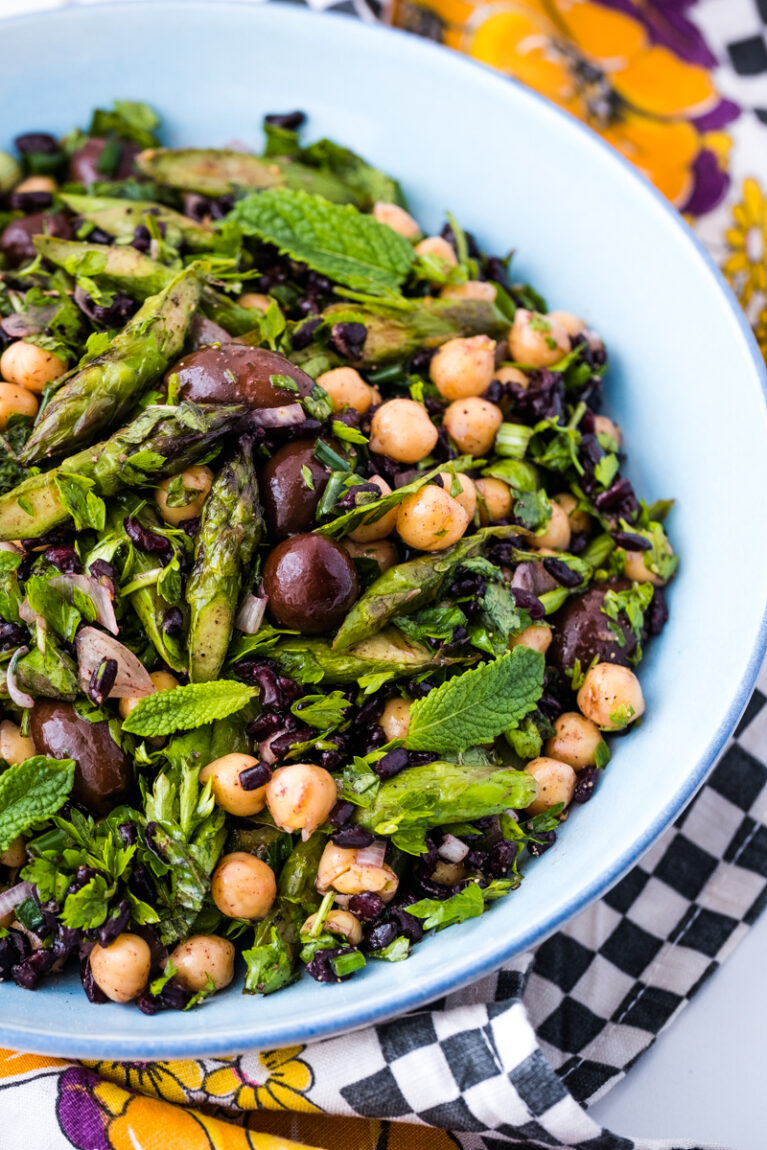Try this lectin-light asparagus and chickpea salad with black rice for a delicious, nutritious, and satisfying plant-based meal at work or home. It’s fresh, easy to put together, and perfect for any time of the day.
Do you have a pressure cooker?
If you are new to eating lectin-free, lectin-light, or following the plant paradox lifestyle, you may think chickpeas and all legumes and beans – are a definitive NO.
However, I am pleased to tell you this is not the case. Dr. Steven Gundry himself, the author of the lectin-free movement, is a fan of beans and legumes, with one condition: they have to be appropriately prepared.
What does that mean? In general, beans and legumes have to be soaked and pressure-cooked before consuming. This preparation process lowers the lectin content and other anti-nutrients while preserving the nutrients.
If you don’t have a pressure cooker, it’s time you invest in one. I work with an Instant Post – I have the 9in1, 6QT – and a manual pressure cooker, and I love both.
How to pressure-cook chickpeas
To lower the lectin content in chickpeas, you have to soak the chickpeas overnight or for about 16 hours, changing the water several times. Then, pressure cook in plenty of water for 23 to 25 minutes and let the pressure release naturally. Drain and cool.
It’s great to have pressure-cooked chickpeas frozen. You can always throw some in a salad, stew, soup, a mix of cooked vegetables, or make a hummus.
Alternatively, you can use organic, BPA-free canned chickpeas, which are pressure-cooked.

How to pressure-cook black rice
Yes, even some types of rice are approved for a lectin-light lifestyle if they are correctly prepared. Rice has to be pressure-cooked and cooled before being consumed. The cooling part is very important, as only cold rice – preferably at least a few hours in the fridge – has the properties of a resistant starch.
However, not all types of rice are plant paradox compliant. Only red rice, black rice, and Indian basmati rice are approved. They all contain melatonin, a mitochondrial must-have, and are considered a great addition to our diet if prepared appropriately and consumed in moderation.
To cook black rice, add one cup of rinsed rice to your pressure cooker and 1 & 2/3 cup of water. Pressure cook on high for 6 minutes. Let the pressure release naturally. If there is any water left in your pressure cooker, drain it. Take a note, and next time add a little less or add one extra minute to the cooking time.
Can you eat asparagus raw?
While I eat raw asparagus mixed in salads, this time, the asparagus is slightly cooked, in a skillet. It’s important you don’t overcook it so it doesn’t get mushy.
Asparagus is one of my favorite vegetables. It is not only a non-starchy vegetable, but it is a low histamine one and has anti-histamine properties. So a perfect addition to your meals if you are trying to keep your diet low histamine. It’s also full of nutrients and a good source of plant-based protein.

The shopping list for the lectin-light asparagus and chickpea salad
In case you need a shopping list, here it is, consolidated all the ingredients you need for this salad:
- Pressure-cooked chickpeas (or canned)
- Pressure cooked and cooled black rice (forbidden rice)
- Asparagus
- Kalamata olives
- The herbs and aromatics: parsley, mint, green or spring onion/scallion
- The spices and dressing: salt, pepper, ground cumin, lemon juice and zest (organic lemon), extra virgin olive oil, apple cider vinegar
A recipe for the 5-day fasting-mimicking diet meal plan Do It Yourself
This lectin-light asparagus and chickpea salad is a recipe I created with the 5-Day Fasting Mimicking Diet Meal Plan in mind. While you have plenty of plant-based, lectin-light, low protein meal ideas in that meal plan, I wanted to create more since this is a cleanse that is recommended regularly.
While I usually don’t count calories, it is helpful if you do the fasting-mimicking diet plan to know that one serving of this salad has about 435 calories, which is great for one meal. If you want to lower it, you can cut down on chickpeas (and increase asparagus) and olive oil.
*This post contains affiliated links, which means I get a small commission if you choose to purchase something via one of my links, at no extra cost to you
Print
Asparagus and Chickpea Salad with Black Rice (Low Lectin)
- Prep Time: 15 minutes
- Cook Time: 7 minutes
- Total Time: 22 minutes
- Yield: 2
Description
For a delicious, nutritious, and satisfying plant-based meal, at work or at home, try this lectin-light asparagus and chickpea salad.
Ingredients
- 10-12 pieces of asparagus, woody ends trimmed, washed and pat dried
- 1 tablespoon extra virgin olive oil
- pinch of salt and pepper for the asparagus
- 1 cup pressure-cooked chickpeas
- 2, 3 tablespoons pressure-cooked and cooled black rice (forbidden rice)
- about 16 kalamata olives
- 3, 4 small green onions, finely sliced
- one generous handful of parsley, washed and dried
- 2, 3 stems of mint, just the leaves
- zest of one organic lemon
- 2 tablespoons extra virgin olive oil (or more to taste)
- 1 teaspoon apple cider vinegar
- juice of 1/2 lemon (more or less to taste)
- 1/2 teaspoon salt (or to taste)
- 1/2 teaspoon pepper (or to taste)
- 1/4 teaspoon ground cumin
Instructions
- Gather and prepare all the ingredients.
- To prepare the asparagus: slice the asparagus at an angle, about 1/2 inch thickness. Heat one tablespoon of extra virgin olive oil in a skillet, on low to medium heat. Add the asparagus and cook, occasionally stirring, for about 7 minutes. Transfer to a plate or bowl and let it cool down.
- In the meantime, add all the ingredients to a salad bowl. Add the asparagus, combine well and taste. Add more salt, pepper, olive oil, and lemon juice if necessary. Serve immediately or box for a work or school lunch.


No Comments